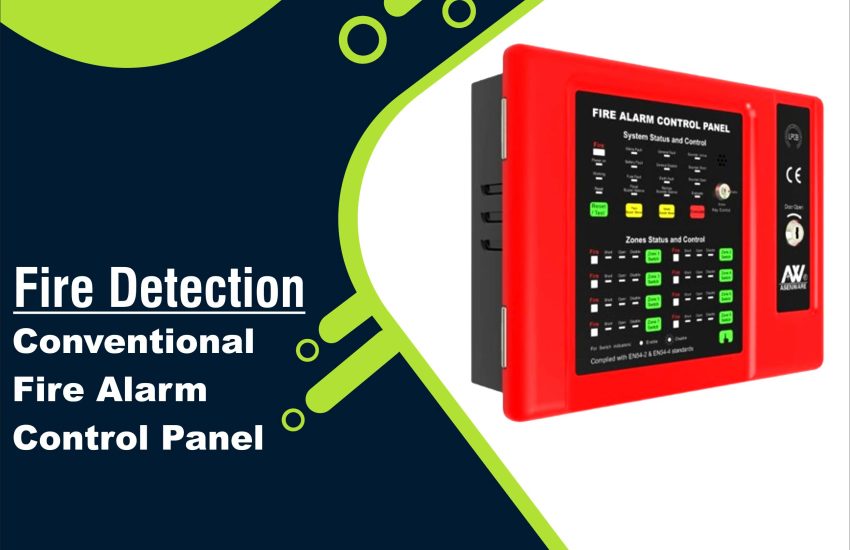Conventional Fire Alarm Control Panel In today’s world, fire safety is a top priority for residential, commercial, and industrial buildings. One of the most essential components of a fire alarm system is the Fire Alarm Control Panel (FACP). This guide will provide a detailed overview of the Conventional Fire Alarm Panel, its working mechanism, types, and how to maintain it effectively.
What is a Conventional Fire Alarm Control Panel?
A Conventional Fire Alarm Panel is the central hub of a fire alarm system. It monitors the status of the fire detection devices, such as smoke detectors, heat detectors, and manual call points, within a building. The control panel processes signals from these devices and activates audible and visual alarms when fire-related events are detected.
Conventional fire alarm systems are ideal for small to medium-sized buildings, where the fire risk is lower and the need for complex systems is not essential. These systems are cost-effective and relatively simple to install, making them a popular choice for many applications.
Key Features of a Conventional Fire Alarm Control Panel
- Alarm Indicator: The control panel provides a visual and audible alarm to indicate that a fire has been detected.
- Circuit Monitoring: It monitors multiple circuits to detect a fault or malfunction in any of the connected devices.
- Zone Identification: The panel divides the building into zones, allowing for easier identification of the location of a potential fire.
- Manual Control: The control panel has manual override options to activate or deactivate specific parts of the system.
How Does a Conventional Fire Alarm Control Panel Work?
A Conventional Fire Alarm Panel operates by receiving input from connected devices like smoke detectors, heat detectors, and manual call points. The basic workflow is as follows:
- Detection: When smoke or heat is detected, the detector sends a signal to the control panel.
- Processing: The panel processes the signal and determines if it indicates a fire or false alarm.
- Alarm Activation: If the signal corresponds to a fire, the panel activates alarms in the designated zone, notifying the occupants and emergency services.
- Fire Safety Actions: In more advanced systems, the panel can activate sprinklers or other fire suppression systems to minimize damage.
Types of Conventional Fire Alarm Control Panels
Conventional fire alarm systems can be categorized into different types based on their features, complexity, and capabilities. These include:
- Basic Fire Alarm Control Panel: This is the simplest form of a fire alarm system, offering basic monitoring and alarm functionalities for small buildings.
- Addressable Conventional Fire Alarm Panel: A more advanced option where each detection device has a unique address, allowing for precise location identification in large buildings.
- Multi-zone Conventional Fire Alarm Panel: This type of panel can monitor multiple zones of a building, giving greater flexibility in identifying the exact location of a fire.
Advantages of a Conventional Fire Alarm Control Panel
The Fire Alarm Control Panel offers several advantages, including:
- Cost-Effective: It is cheaper compared to addressable fire alarm systems, making it suitable for smaller buildings with simpler fire safety needs.
- Easy to Install: Due to its simplicity, it is relatively easier and quicker to install.
- Simple Operation: The system is straightforward to operate, making it user-friendly for building owners and safety personnel.
- Scalability: The system can be expanded to cover larger areas with the addition of more zones and detectors.
Disadvantages of a Fire Alarm Panel
While conventional fire alarm systems have many benefits, they also come with some limitations:
- Limited Detection Capacity: Conventional systems are less sophisticated than addressable systems and can only identify the zone where a fire occurs, not the exact location.
- Higher Maintenance Costs: In large buildings, conventional systems may require more maintenance, especially when adding extra detectors and circuits.
- Limited Features: They may lack advanced features such as remote monitoring, advanced reporting, or integration with other building management systems.
Choosing the Right Conventional Fire Alarm Control Panel
When selecting a Fire Alarm Panel, consider the following factors:
- Building Size and Complexity: For larger buildings, you may need a multi-zone control panel to manage different areas.
- Budget: Conventional fire alarm systems are more affordable than advanced systems, but your budget should also take into account installation and maintenance costs.
- Local Regulations: Ensure that the system complies with local fire safety regulations and standards.
- Future Expansion: If you plan to expand your building or fire safety needs in the future, choose a panel that allows for easy expansion.
How to Maintain a Conventional Fire Alarm Control Panel
Proper maintenance of the Fire Alarm Panel ensures that it works efficiently in case of a fire. Here are some essential maintenance tips:
- Regular Testing: Conduct periodic tests to ensure all detectors and alarms are functioning properly.
- Battery Checks: Replace batteries regularly to avoid system failure during a fire emergency.
- System Inspections: Have a professional inspect the control panel and connected devices to detect any faults or issues.
- Clean Detectors: Dust and debris can interfere with the functioning of detectors, so make sure to clean them regularly.
Conclusion
Fire Alarm Control Panel is an essential component of any building’s fire safety system. It provides reliable fire detection and warning capabilities, making it ideal for smaller buildings and budget-conscious installations. By understanding its components, working mechanism, and maintenance requirements, you can ensure that your system provides maximum protection to the building and its occupants. Whether you are installing a new fire alarm system or maintaining an existing one, choosing the right Fire Alarm Panel is crucial for optimal performance and safety.


